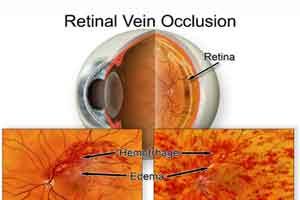- Home
- Editorial
- News
- Practice Guidelines
- Anesthesiology Guidelines
- Cancer Guidelines
- Cardiac Sciences Guidelines
- Critical Care Guidelines
- Dentistry Guidelines
- Dermatology Guidelines
- Diabetes and Endo Guidelines
- Diagnostics Guidelines
- ENT Guidelines
- Featured Practice Guidelines
- Gastroenterology Guidelines
- Geriatrics Guidelines
- Medicine Guidelines
- Nephrology Guidelines
- Neurosciences Guidelines
- Obs and Gynae Guidelines
- Ophthalmology Guidelines
- Orthopaedics Guidelines
- Paediatrics Guidelines
- Psychiatry Guidelines
- Pulmonology Guidelines
- Radiology Guidelines
- Surgery Guidelines
- Urology Guidelines
Glaucoma increases risk for retinal vein occlusion

Glaucoma increases the risk for the development of retinal vein occlusion (RVO), according to a recent study published in the journal Acta Ophthalmologica. The findings indicate that while investigating patients with RVO in the clinic, glaucoma should be kept in mind.
Retinal vein occlusion is a common vascular disorder of the retina that occurs due to blockage of the small veins that carry blood away from the retina. It is generally classified as central retinal vein occlusion (CRVO) or branch retinal vein occlusion (BRVO). RVO is associated with older age, symptomatic ischemic heart disease, higher systolic blood pressure and uncontrolled hypertension.
Glaucoma is the leading cause of irreversible blindness worldwide. It is characterized by optic nerve degeneration and progressive peripheral vision loss. Degeneration occurs due to elevated intraocular pressure that causes changes in the iridocorneal angle.
The relationship between glaucoma and RVO has always been a topic of heated controversy. Although many studies have been conducted on this topic, still uncertainties exist about its course. Peirong Lu, The First Affiliated Hospital of Soochow University, Suzhou, China, and colleagues summarized epidemiological evidence on the association between glaucoma and the risk of RVO.
For the purpose, the researchers identified relevant studies by searching PubMed, EMBASE and Cochrane databases until February 2018. Fifteen eligible observational studies were aggregated in this analysis.
Also Read: Avastin as effective as Eylea for treating central retinal vein occlusion
Key findings of the study include:
- In all studies, the odds ratio (OR) of glaucoma as a risk factor for RVO was 4.01.
- In RVO subtype-differentiated subgroup analyses (six studies), the pooled OR showed that glaucoma was associated with central retinal vein occlusion, branch retinal vein occlusion and hemiretinal vein occlusion (HRVO)
- In glaucoma-classified subgroup analyses (five studies), primary open-angle glaucoma (POAG) and chronic open-angle glaucoma (COAG) were significant risk factors for RVO development.
- There was a plausible relationship between primary angle closure glaucoma (PACG) and RVO risk; to be precise, the OR was 5.3 in PACG and CRVO risk, while the OR was 0.65 in PACG and BRVO risk.
Also Read: Researchers create first tomography map for diagnosing glaucoma
"The meta-analysis demonstrated that glaucoma is a significant risk factor for RVO. It was indicated that OAG (POAG/COAG) could increase the incidence of RVO, particularly for CRVO. Meanwhile, there was less association betweenPACG and RVO, especially forBRVO. The outcome of our meta-analysis is meaningful for clinical judgments. The controversial results should be clarified with large-scale prospective and high-quality epidemiologic studies in the future," concluded the authors.
To read the complete study log on to https://doi.org/10.1111/aos.14141

Disclaimer: This site is primarily intended for healthcare professionals. Any content/information on this website does not replace the advice of medical and/or health professionals and should not be construed as medical/diagnostic advice/endorsement or prescription. Use of this site is subject to our terms of use, privacy policy, advertisement policy. © 2020 Minerva Medical Treatment Pvt Ltd